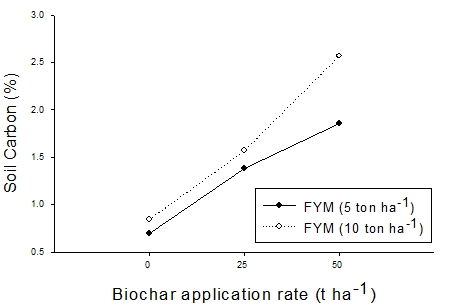RESIDUAL EFFECT OF BIOCHAR ON BERSEEM PRODUCTIVITY AND SOIL QUALITY UNDER DIFFERENT FARM YARD MANURE AND NITROGEN LEVELS
DOI:
https://doi.org/10.71146/kjmr393Keywords:
Berseem, Biochar, Farm yard manure, Nitrogen, Soil fertilityAbstract
To study the residual effect of biochar on berseem productivity and soil quality under different farmyard manure and nitrogen levels, a field experiment was performed at Agronomy Research Farm, The University of Agriculture, Peshawar-Pakistan during Fall 2013-2014. Randomized complete block design was used for conducting experiment with three replications. Three residual biochar levels (0, 25 and 50 t ha-1), farm yard manure two levels (5 and 10 t ha-1) and two levels of nitrogen (15 and 30 kg ha-1) were included in experiment. 50 t ha-1 biochar applications resulted in elevated plant height, fresh and dry fodder yield. Higher values for these traits were observed with the addition of 25 t biochar to the previous crop. FYM at the rate of 10 t ha-1 produced taller plants, higher fresh and dry fodder yield. Plots treated with 30 kg N ha-1 resulted in taller plants, higher fresh and dry fodder yield. Similarly, farmyard application @10 t ha-1 resulted in higher soil carbon, soil total nitrogen and soil pH. Residual biochar @50 t ha-1 increased soil pH, EC, carbon and total nitrogen. It was concluded from the study that 50 t ha-1 BC, 10 t ha-1 FYM and 30 kg ha-1 N increased fodder yield, whilst BC application @50 and FYM application @10 t ha-1 improved soil physio-chemical properties.
Downloads

Downloads
Published
Issue
Section
License
Copyright (c) 2025 Muhammad Rabnawaz Khan, Fazal Jalal, Awais Ahmad, Sarir Ahmad, Aneeha Amin, Muhammad Ilyas Khan, Murad Khan, Muhammad Shahab Khan, Said Badshah (Author)

This work is licensed under a Creative Commons Attribution 4.0 International License.






